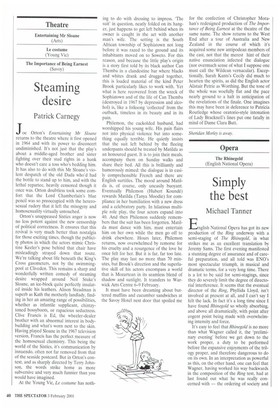Steaming desire
Patrick Camegy
Joe Orton's Entertaining Mr Sloane returns to the theatre where it first opened in 1964 and with its power to disconcert undiminished. It's not just that the play's about a middle-aged brother and sister fighting over their stud rights in a hunk who doesn't care a toss who's bedding him. It has also to do with this Mr Sloane's violent despatch of the old Dada who'd had the bottle to stand up to him, and with the lethal repartee, heavily censored though it once was. Orton doubtless took some comfort that the Lord Chamberlain's blue pencil was so preoccupied with the heterosexual rudery that it left the misogyny and homosexuality virtually untouched.
Orton's unappeased Sixties anger is now no less potent against the new censorship of political correctness. It ensures that this revival is very much better than nostalgia for those exciting times, though the publicity photos in which the actors mimic Christine Keeler's pose behind that chair have misleadingly strayed down that route. We're talking about life beneath the King's Cross gasometers, not by the swimmingpool at Cliveden. This remains a sharp and wonderfully written comedy of steaming desire wrapped around Neil Stuke's Sloane, an ice-block quite perfectly insulated inside his leathers. Alison Steadman is superb as Kath the motherly landlady, finding in her an amazing range of possibilities, whether as infantile supplicant, chintzytoned bossyboots, or rapacious seductress. Clive Francis is Ed, the wheeler-dealer brother with an abnormal interest in bodybuilding and what's worn next to the skin. Having played Sloane in the 1967 television version, Francis has the perfect measure of the homosexual chemistry. This being the world of the Sixties, it's communication by innuendo, often not far removed from that of the seaside postcard. But in Orton's context, and as sharply directed by Terry Johnson, the words strike home as more subversive and very much funnier than you would have imagined.
At the Young Vic, Le costume has noth
ing to do with dressing to impress. 'The suit' in question, neatly folded on its hanger, just happens to get left behind when its owner is caught in the act with another man's wife. The setting is the South African township of Sophiatown not long before it was razed to the ground and its inhabitants moved on to Soweto. For this reason, and because the little play's origin is a story first told by its black author Can Themba in a clandestine bar where blacks and whites drank and drugged together, this is loaded material of the kind Peter Brook particularly likes to work with. Yet what is here recovered from the wreck of Sophiatown and of the life of Can Themba (destroyed in 1967 by depression and alcohol) is, like a folksong 'collected' from the outback, timeless in its beauty and in its pain.
Philemon, the cuckolded husband, had worshipped his young wife. His pain flairs not into physical violence but into something equally terrible. He quietly insists that the suit left behind by the fleeing underpants should be treated by Matilda as an honoured guest. It is to join their meals, accompany them on Sunday walks and share their bed. All this is brilliantly and humorously mimed: the dialogue is in easily comprehensible French and there are English surtitles. The mood around Matilda is, of course, only uneasily buoyant. Eventually Philemon (Hubert Kounde) rewards Matilda (Tanya Moodie) for compliance in her humiliation with a new dress and a celebratory party. In hilarious multiple role play, the four actors expand into 40. And then Philemon suddenly remembers that the suit has been forgotten. Matilda must dance with him, must entertain him on her own while the men go off to drink elsewhere. Hours later, Philemon returns, now overwhelmed by remorse for his cruelty and a resurgence of the love he once felt for her. But it is far, far too late. The play may last no more than 70 minutes, but Brook's direction and the superlative skill of his actors encompass a world that is Mozartean in its seamless blend of shadow and sunlight. It transfers to Warwick Arts Centre 6-9 February.
It must have been dreaming about buttered muffins and cucumber sandwiches at the Savoy Hotel next door that spoiled me
for the confection of Christopher Morahan's redesigned production of The Importance of Being Earnest at the theatre of the same name. The show returns to the West End after a tour of Australia and New Zealand in the course of which it's acquired some new antipodean members of the cast, not that the merest hint of their native enunciation infected the dialogue (nor overmuch sense of what I suppose one must call the Wildean vernacular). Exceptionally, Sarah Kants's Cecily did much to hearten the spirits, as did the English actor Alistair Petrie as Worthing. But the tone of the whole was woefully flat and the pace nearly ground to a halt in anticipation of the revelations of the finale. One imagines this may have been in deference to Patricia Routledge whose oratorio-style intonation of Lady Bracknell's lines put one fatally in mind of Dame Clara Butt.
Sheridan Morley is away.


























































 Previous page
Previous page